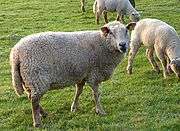Twyne's Case
| Twyne’s case | |
|---|---|
 | |
| Court | Star Chamber |
| Citation(s) | (1601) 3 Coke 80; (1601) 76 ER 809 |
| Keywords | |
| Fraudulent conveyance | |
Twyne’s case (1601) 76 ER 809 is a UK insolvency law case, concerning a fraudulent conveyance. Representative of earlier English law, it was considered that any transfer of property from a debtor to a creditor, after which the debtor remained in possession of that property, was a fraudulent act intended to defraud creditors.[1] At the time, the law only recognised the mortgage and the pledge. A charge on property in possession of another was not allowed.[2]
Facts
Pierce, a farmer, owed Twyne of Hampshire £400. He also owed another creditor £200, and this creditor brought an action. While the writ was pending, Pierce sold his sheep to Twyne to pay off his debt. However, Pierce remained in possession of the sheep, marking and shearing them. At the other creditor’s instance, the Sheriff of Southampton came to collect the sheep. Twyne and his acquaintances resisted this. Twyne argued that he was a bona fide purchaser for valuable, and not inadequate, consideration within the Fraudulent Conveyances Act 1584 (27 Eliz c 4).
Judgment
The Star Chamber (Sir Thomas Egerton, Chief Justice Popham and Anderson) held this was an attempt to defraud his creditors under the Fraudulent Conveyances Act 1571 (13 Eliz c 5). The following reasons were given.
| “ | 1st. That this gift had the signs and marks of fraud, because the gift is general, without exception of his apparel, or any thing of necessity; for it is commonly said, quod dolus versatur in generalibus.
2nd. The donor continued in possession, and used them as his own; and by reason thereof he traded and trafficked with others, and defrauded and deceived them. 3rd. It was made in secret, et dona clandestina sunt semper suspiciosa. 4th. It was made pending the writ. 5th. Here was a trust between the parties, for the donor possessed all, and used them as his proper goods, and fraud is always apparelled and clad with a trust, and a trust is the cover of fraud. 6th. The deed contains, that the gift was made honestly, truly, and bona fide: et clausulæ inconsuet’ semper inducunt suspicionem. |
” |
It was further held that the gift may have been on good consideration, but could not be bona fide.
| “ | the intent of the Act was, that the consideration in such case should be valuable; for equity requires, that such gift, which defeats others, should be made on as high and good consideration as the things which are thereby defeated are... | ” |
See also
Notes
- ↑ Warren, Westbrook, Porter, & Pottow (2014). The Law of Debtors and Creditors: Text, Cases, and Problems (Seventh ed.). Wolters Kluwer Law & Business. pp. 542–543. ISBN 9781454822387.
- ↑ Jay D. Adkisson. "Two Ancient English Statutes And A Dispute Over Modern Voidable Transactions Law". Forbes. Retrieved 10 July 2017.